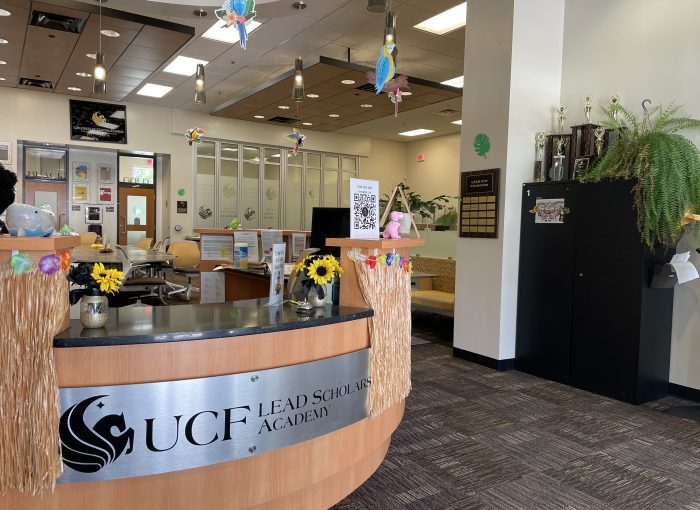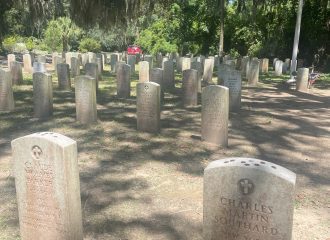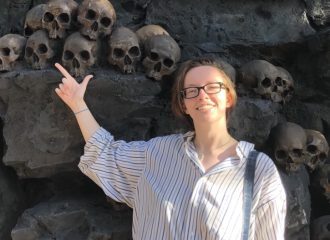by Kaitlyn Solberger
Starting college the first time is hard enough. Imagine starting it twice.
When I began at UCF, we were just approaching the tail end of the pandemic. Remote courses were still all the rage, but masks had become optional, and many students were beginning to form the relationships they lost after being distant for so long. While others quickly found their connections and sense of belonging, I was slowly getting used to being around my college-aged peers and navigating a nearly endless array of similar-looking buildings.
By midpoint in the year, things with my roommate reached a breaking point. While still trying to acclimate to the UCF community, I found myself returning home with hopes of putting my education first and escaping unnecessary drama. All the time that I spent moving into my dorm, seeking out friends, and learning how to walk from my place to the library began to feel like a distant memory.
The process of returning to my hometown and away from our “Knight Nation” left me feeling alienated from the place I once called home and a community I used to cherish. I often worried that this back-to-basics transition would make me less like my peers and cause them to lose respect for all that I had worked so hard to achieve. I spent endless nights wondering whether I would be successful or if my life would only amount to living out of my parent’s spare bedroom. I feared sharing my story and my struggle with our community, often doing anything I could to keep my living situation under wraps. Around others, the last thing I wanted to be was different. The last thing I wanted to be was a failure.
In an effort to reintegrate myself into the UCF community, I decided to take on a larger role in the single RSO I continued to be a part of throughout this difficult time: the LEAD Scholars Academy. This organization had provided me a safety net on my first days at the university and given me a smaller-sized group to connect with. It was the only organization that always made me feel like I had a place on our campus. Wanting to spread that hospitality to our school’s prospective students and reform roots into our community, I decided to take on a leadership position in LEAD. This newfound role gave me greater exposure to our student body and allowed me to quickly reaffirm my place on our campus. However, this role alone was not enough to make the university my home – that came from my LEAD advisor.
Fresh to the university as an incoming instructor and our newly appointed advisor, Professor Torres began her transition into the campus at the same time I did. As she was exploring our school, learning where things were, and getting accustomed to the traditions our student body holds so dear, I started to edge back into the college environment and social circles I had been away from for so long. At first, this transition was terrifying, and the same fears of inadequacy continued to haunt me everywhere I went. It only took one meeting with Professor Torres to change that. She was the first person at the university who took the time to get to know me.
Rather than asking the basic questions about my degree or hobbies, she spent the majority of our first meeting together learning my story. She was genuinely interested in knowing where I hoped to go in the future and what my dreams were. Beyond learning about the positives in my life, Professor Torres never shied away from learning about the things that were less than ideal. She embraced the areas of myself that I wanted to improve and any flaws that I shared, making it her personal mission to accept every part of who I was and help me become the best version of myself.
Professor Torres asked me a question that I will never forget: she asked me what my personal mission was. Who did I want to be and what did I want to leave behind?
Before parting ways during our first meeting, Professor Torres asked me a question that I will never forget: she asked me what my personal mission was. Who did I want to be and what did I want to leave behind? While I knew that I wanted to make a positive impact on others and do my job well, this was something I had never considered before. That single question had enough power to resonate with me for the weeks, months, and entire year afterwards. This very question was the driving force to everything we accomplished over the course of the year and the light that kept me moving forward.
The next time I came into her office, I knew what I wanted to do and the leader I wanted to become. Aside from being someone that people trusted and enjoyed working alongside, it was important that my time be meaningful. I strived to improve our organization and make a difference for the entire student population by making our program more accessible and attainable for incoming classes. As I shared my passion for including others and creating a more diverse space, Professor Torres invited me into her past and her experiences for the first time. She told me her story as a first-generation minority student, completely changing my outlook on life and perspective on my peers.
Starting at the very beginning, she shared stories of moving around frequently in her youth so her parents could follow job opportunities. With such limited options available, they spent time in city after city, school after school. Following her high school graduation, she began the process of enrolling in a university and pursuing a college degree. Being the first person in her family to tread this path, Professor Torres had to figure out all the necessary steps with little guidance along the way.
As she learned how to navigate her own college life, she began to meet people with similar or drastically different stories than what she had endured. Through these conversations about her past, her experiences, and the interactions she had with hundreds of other people along the way, she broadened my view of the world. She changed the way that I viewed our campus and my place in it. She enlarged my understanding of the trials and tribulations of others. Ultimately, she changed my life for the better.
While I had always been an empathizer, our conversations allowed me to look beyond my own experiences to connect with others on a level I was never able to before. For the first time, I was able to picture what others may have endured, see how that shaped their worldview, and gain a greater appreciation for how those differences could be brought together to change the entire planet. Beyond better connecting me with my peers, my experience with Professor Torres solidified who I wanted to be. Not just for today or tomorrow, but for the rest of my life.
Our conversations ignited my passion for diversity, inclusion, and creating opportunities where there otherwise were not any.
Without the support of my advisor, what came next would have been impossible: acting on it. Our conversations ignited my passion for diversity, inclusion, and creating opportunities where there otherwise were not any. It is because of Professor Torres that I was able to make LEAD Scholars more accessible to military families and the non-traditional student. It is because of Professor Torres that we began offering information about our program in multiple languages and modalities. It is because of Professor Torres that our collective efforts generated over 800 hours’ worth of service opportunities to support first-time college admits.
None of these strides forward would have been possible without the support and guidance of Professor Torres. The unmatched dedication to her craft and empowerment towards success created an indelible mark on my life, propelling me forward as the individual I have always wanted to become. Having her as my advisor allowed me to achieve things I never could have dreamed of, learn lessons I never would have learned otherwise, and become a new person by the time I left my leadership role. While shaping me as a leader and a student, she simultaneously supported me while I discovered my space in the LEAD Scholars Academy. By the end of the year, I no longer felt loosely tied to our RSO or the Knight Nation – I felt like I had found my friends, my family, my passions, and myself.



